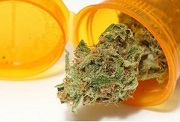The Culture High - Schizophrenia-Cannabis-Marijuana
This short youtube clip is a must see for all those that have been convinced that cannabis causes mental health issues.
The argument has been used as propaganda tool for way too long, time for expert advice.
Derived for the documentary "A Culture High".
These two renowned professors, Dr. Lester Grinspoon and Dr David John Nutt, give their well educated opinions;
Dr. Lester Grinspoon (born June 24, 1928) is Associate Professor Emeritus of Psychiatry at Harvard Medical School. Grinspoon was senior psychiatrist at the Massachusetts Mental Health Center in Boston for 40 years. Dr. Grinspoon is a fellow of the American Association for the Advancement of Science and the American Psychiatric Association. He was founding editor of the The American Psychiatric Association Annual Review and the Harvard Mental Health Letter. Grinspoon was editor of the Harvard Mental Health Letter for fifteen years.
David John Nutt (born 16 April 1951) DM FRCP FRCPsych FMedSci is a British psychiatrist and neuropsychopharmacologist specialising in the research of drugs that affect the brain and conditions such as addiction, anxiety and sleep. He was until 2009 a professor at the University of Bristol heading their Psychopharmacology Unit. Since then he has been the Edmond J Safra chair in Neuropsychopharmacology at Imperial College, London. Nutt was a member of the Committee on Safety of Medicines, and was President of the European College of Neuropsychopharmacology. His book "Drugs without the hot air" (UIT press) won the Transmission Prize for Communicating Science in 2014
A Body Lacking Soul
After the announcement that Australian state Victoria plans to introduce a legalisation model for medicinal cannabis, Australia as a nation appears to be preparing to follow suit.
On the face of it, such news seems to have only positive connotations and after decades of baseless prohibition and shameless lies and propaganda, an awareness of the medicinal value of cannabis appears to be gaining some long overdue attention by the mainstream media.
In the recent publication of Body + Soul, a popular health and lifestyle magazine, their recent article titled "Medical Marijuana Trial in Australia: What you need to know" discusses this subject.
The article begins by subtly, and probably unintentionally, alluding to the monetary motives of this new found enthusiasm for medicinal cannabis by referring to the fact that "Federal Health Minister Susan Ley has said that a medical marijuana industry could flourish in Australia".
The article continues by confirming that "The NSW Government is currently establishing a state-based scheme, Queensland is joining in clinical trials, while the premier of Tasmania, Will Hodgman, has released a statement expressing his enthusiasm at working with the Federal Government to cultivate medical cannabis in his state."
So many voices in the government are now expressing their "enthusiasm" for cultivating a plant that remains illegal for regular citizens.
Australian Drug Foundation’s national policy manager, Geoff Munro, was quoted expressing his approval by speaking of the benefits to patients along with their carers, who are currently criminalised for their attempts to utilise this medicinal plant, by stating that "although the main benefactors will be those who are suffering from pain and illness that can’t be relieved by current medications and conventional methods, the changes are also going to bring peace of mind to their carers who not only have to watch their loved ones suffer, but who may also have to deal with the stressful situation of sourcing cannabis illegally themselves.”
Such "peace of mind" could be facilitated quickly and easily by removing the prohibition of cannabis but it seems that government officials are adamant that such mercy should only be granted when they have control over the production of cannabis, along with all profits to be gained from it (likely 2017).
In addition, such mercy will only be granted for specific patients, using specific government approved cannabis medicines, for specific ailments. Everyone else will continue to be criminalised.
Mr Munro preceded that comment by admitting that “We know through years of mounting evidence and research that medical cannabis can assist with everything from preventing or decreasing epileptic seizures to effective pain relief for cancer patients.”
Such an admission does beg the question as to why they have been happy to continue prohibiting cannabis use, possession and cultivation, criminalising very sick people, when they are obviously well aware of the benefits this medicine can provide.
Any patients who do not fall within the very narrow remit of eligibility will continue to be criminalised and even those who do qualify will have to wait until 2017.
In describing the details of what medicinal cannabis is, the author insists that readers should "Do away with thoughts of a backyard weed operation; "medical cannabis is a selected strain of the plant which is grown, cultivated and processed under the sort of strict guidelines that apply to other pharmaceutical products."
In reality, medical cannabis is a meaningless term when referring to strains. It is the utilisation that qualifies it as medicinal not the strain used.
Different strains of cannabis have different cannabinoid profiles and some are inevitably more beneficial for certain conditions than others.
Cannabis strains commonly used for recreational purposes generally tend to be higher in THC, as that is the psychoactive component of the plant.
However such strains are very beneficial for many medical applications, like Glaucoma and many forms of cancer, as THC is also an incredibly medicinal compound with a wide range of established medicinal properties and many other potential benefits that are still under investigation.
While CBD is gaining a lot of attention for its numerous medical applications, including anti epileptic, anti inflammatory and pain relieving qualities, it is not the only cannabinoid with both tremendous medicinal potential and unrivaled safety.
In fact a perfect example of the limits of CBD dominant cannabis extracts, along with the need to try different varieties of cannabis medicines, has been demonstrated by the numerous epilepsy patients who have replaced high CBD extracts with raw THCA extracts, reporting greater success with the THCA extracts than they had experienced with CBD dominant oils.
THCA is the raw acidic precursor to THC and, like CBD, is not psychoactive.
Although it does not possess the same medicinal properties of THC it does have many medicinal properties, including apparent anti epileptic properties, which, according to numerous patient reports, provides greater long term efficacy than CBD extracts for many.
anecdotal references;
http://www.ladybud.com/2014/04/02/cannabis-and-my-kid/
http://www.medicaljane.com/2014/07/03/cannabis-classroom-the-role-of-cannabis-in-epilepsy-and-seizure-disorders/
Restrictive medicinal programs will not allow patients to explore potentially superior cannabis extracts, like THCA dominant medicines, when they are limiting patients to only specific pharmaceutical cannabinoid drugs.
The article also presents the reader with quotes from Professor Sanchia Aranda, CEO of the Cancer Council Australia.
Despite confessing to, and elaborating on, the numerous palliative benefits cannabis can provide to cancer patients, like the anti nausea, appetite stimulating and pain relieving properties, Professor Aranda insists that there is "no evidence that cannabis or cannabinoids have a curative effect on cancers, as has been previously claimed."
To question the degree to which cannabis as an anti cancer substance has been established is one thing, but to deny that there is any evidence at all is quite another.
Largely due to the legal restrictions, cannabis research has been heavily suppressed and hindered. Yet, despite the obstacles, there is a large body of evidence that cannabis does indeed have profound anti cancer properties.
More than 100 peer reviewed studies exist demonstrating significant anti cancer effects from cannabinoids, with the main focus concentrating on THC and CBD, but with preliminary data and pre-clinical studies alluding to the potential for a large number of cannabinoids and cannabinoid acids as anti cancer compounds (with CBDA, THCA, CBGA, CBG, CBC and CBN all showing potential efficacy of varying degrees, in addition to the more established anti cancer effects of THC and CBD).
There is also a growing body of evidence supporting the importance of the "entourage effect", where combinations of different cannabinoids are able to enhance each others therapeutic efficacy, to the point that such combinations are proving greater than the some of their parts. It is clear that naturally occurring combinations of cannabinoids are by far superior to isolated cannabinoids.
http://www.cancer.gov/about-cancer/treatment/cam/hp/cannabis-pdq#section/all
http://www.ncbi.nlm.nih.gov/pmc/articles/PMC3901602/
http://cancerres.aacrjournals.org/content/66/13/6748.abstract
http://www.ncbi.nlm.nih.gov/pubmed/21475304
http://www.ncbi.nlm.nih.gov/pubmed/16908594
http://onlinelibrary.wiley.com/doi/10.1002/ijc.23584/abstract
http://molpharm.aspetjournals.org/content/70/5/1612.abstract
http://www.ncbi.nlm.nih.gov/pubmed/22594963
http://www.ncbi.nlm.nih.gov/pmc/articles/PMC3339795/?tool=pubmed
http://www.ncbi.nlm.nih.gov/pubmed/12746841?dopt=Abstract
http://www.ncbi.nlm.nih.gov/pubmed/21097714?dopt=Abstract
http://www.ncbi.nlm.nih.gov/pubmed/22198381?dopt=Abstract
http://www.nature.com/onc/journal/v27/n3/abs/1210641a.html
http://molecular-cancer.biomedcentral.com/articles/10.1186/1476-4598-9-196
http://www.ncbi.nlm.nih.gov/pubmed/20859676
http://jpet.aspetjournals.org/content/308/3/838.abstract
http://www.jneurosci.org/content/21/17/6475.abstract
http://www.nature.com/bjc/journal/v95/n2/abs/6603236a.html
The studies listed above are not even close to representing all the data supporting anti cancer properties of cannabis, but is plenty sufficient enough to confirm that claims that there is "no evidence" are not accurate.
Also the links provided here refer to the scientific evidence only. We are not even mentioning the massive body of anecdotal evidence, much of which is well supported, that reveals numerous real life cases where cannabis has been used successfully as a treatment for late stage cancers.
Below are two videos, one brief the other more in depth, where Dr Christina Sanchez explains her work in the area of cannabinoids as anti cancer compounds.
https://www.youtube.com/watch?v=1miGzTwK28U
https://www.youtube.com/watch?v=rnVisZVZfHc
Numerous scientists have worked diligently to build up a large body of evidence demonstrating that cannabinoids like THC and CBD have profound and selective anti cancer properties that include, but are not limited to, outright cancer killing effects.
Despite palliative benefits and the well supported potential for actually treating many forms of cancer with cannabis extracts, terminal cancer patients are still denied legal access to cannabis in any form.
In fact not only are such people denied access to cannabis but they are actually, and actively, criminalised for any attempts to utilise this non toxic plant.
Professor Aranda adds to this by saying "We need to differentiate between the benefits of giving suitable patients access to medicinal cannabis in a controlled form and the risks and harms associated with patients smoking cannabis plants with unpredictable cannabinoid levels [the active components of cannabis], which in some cases can lead to psychological harm".
It seems the standards of evidence are somewhat awkwardly juxtaposed when looking at medicinal benefits of cannabis compared to potential detriments.
There is simply no definitive evidence to support the claim that cannabis can cause, or even trigger, mental illness. The evidence that does exist on the subject strongly refutes such claims.
Many experts on mental illness have expressed their aversion at this unscientific misrepresentation of the facts, with Dr Lester Grinspoon an expert in Schizophrenia and Associate Professor Emeritus of Psychiatry at Harvard Medical School, describing the claims as absurd, citing (among other things) the fact that instances of mental illnesses have not increased in correlation to increases in cannabis use in any observed populations.
Below are just two studies debunking cannabis' alleged links to mental illness.
http://www.ncbi.nlm.nih.gov/pubmed/19560900
http://www.ncbi.nlm.nih.gov/pubmed/24309013
Below is a brief video, from the documentary "The Culture High" featuring experts on the subject explaining what the evidence really says about this issue.
https://www.youtube.com/watch?v=UCggeEoNGCQ
The data on this has made it pretty clear but one final nail in the coffin of this particular piece of propaganda is the fact that cannabis extracts produced by British based company
GW Pharmaceuticals are currently being trialed as a treatment for schizophrenia (supporting the idea that sufferers who use cannabis do so as a way of self medication, rather than it having any causal effect). At least one cannabinoid, Cannabidiol (CBD), has been categorised as an anti psychotic and others, like CBC, are also being explored in this area. Even the much demonised THC has potential benefit for mental illness with PTSD considered an area where high THC strains can be very helpful.
http://veteransformedicalmarijuana.org/content/general-use-cannabis-ptsd-symptoms
http://newmedia-eng.haifa.ac.il/?p=6774
http://www.sciencedaily.com/releases/2013/05/130514085016.htm
http://www.leafscience.com/2013/11/11/dr-sue-sisley-explains-hope-marijuana-ptsd-video/
In its currently proposed form, the medicinal legalisation model could represent massive benefits for many desperately ill people.
Even the most ardent cannabis campaigner would not deny the value of medical supervision, assistance and controls that an official medical cannabis program could provide.
However, help could be provided simply by removing the prohibition on cannabis which serves to funding criminal organisations and causing tremendous suffering criminalising otherwise law abiding citizens.
The biggest issues for patients are who is eligible for this state sanctioned medical cannabis and what cannabis medicines will be available to them.
Body + Soul list who is eligible in their article:
"Only those who fit into the following categories may seek legal treatment:
Multiple sclerosis sufferers with severe muscle spasms and/or pain.
Cancer and HIV/AIDS patients experiencing severe pain, nausea and vomiting.
Those who suffer from severe epileptic seizures (if not responding to conventional treatment).
Those who experience severe chronic pain in cases where two specialist medical practitioners think medical cannabis may be more effective than other medical treatments."
Glaucoma sufferers will not be granted access despite cannabis, specifically THC, already being well established as the best, and sometimes only, medicine for them.
Cancer patients will only be allowed cannabis as a palliative medicine, so cancer patients, even terminal patients, keen to explore the potential anti cancer effects
(which have been demonstrated as completely selective and non toxic to healthy cells) will also be denied that chance.
Other autoimmune diseases, outside of MS, will be excluded. Parkinson's Disease will not qualify, despite well established benefits that have lead to Israel granting medical access.
Even epilepsy sufferers will not have access to cannabis medicines unless they have already exhausted all "conventional" treatments, many of which are tremendously
dangerous. Even when they have qualified they will likely only be allowed to utilise a narrow range of cannabis medicines, likely CBD dominant extracts only, despite the evidence that raw THCA can have greater efficacy.
And absolutely no allowance will be given for preventative use of cannabis, even non psychoactive raw cannabis, despite well established properties for decreasing the risk of strokes.
In Addition, there is very strong evidence to suggest the potential to prevent Diabetes, Alzheimer's disease and a wide variety of other conditions.
http://www.google.co.uk/patents/US6630507
To quote Judge Francis Young, whom headed a US government investigation into cannabis, Cannabis "in its natural form is one of the safest and most therapeutically active substances known to man".
http://www.ccguide.org/young88.php
Full Document - http://www.google.co.uk/patents/US6630507
For some, this medical program proposed by the Australian authorities may represent profound benefit (in 2017).
For others, the prohibition remains and sick people continue to suffer and die, while otherwise lawful citizens are criminalised.
Author; Matt Sands
Study: Cannabinoids are Safe, Effective for Pain Treatment
Investigators from Dalhousie University in Halifax, Nova Scotia and McGill University in Montreal evaluated the results...
Cancer Treatment With Cannabinoids
Fundacion Daya; based in Chile, is presently conducting trials on cancer patients using cannabinoids, below is a basic translation.
The following article has been translated from http://cannabismedicinal.cl/cannabis-y-su-aplicacion/cancer/ with Google translate, please allow for any inaccuracies.
Latest
Coronavirus Strikes Massachusetts Cannabis Company Employees
Reassessing the Essential: Cannabis in the Time of a Pandemic
5 Reasons To Try Aspen Valley CBG Flower (30% Off)
High Times Cannabis Cups Go Virtual In Wake Of Coronavirus Pandemic
Drug Enforcement Administration Proposes Plan To Expand Cannabis Research
Ghana Legalizes Cannabis For Medicinal And Industrial Uses
The cheapest legal weed in Canada: Discover these cannabis ‘value brands’
Cannabis and coronavirus: Here’s what you need to know
cannabis designs
The Best Of
WHO Rules CBD Should Not Be a Scheduled Drug

Dr Cristina Sanchez PhD video interview on medical marijuana and cancer

Biochemist Dennis Hill interview; Cannabis oil as a cure for cancer.

The unofficial World Record holder for cannabis smoking part 1









